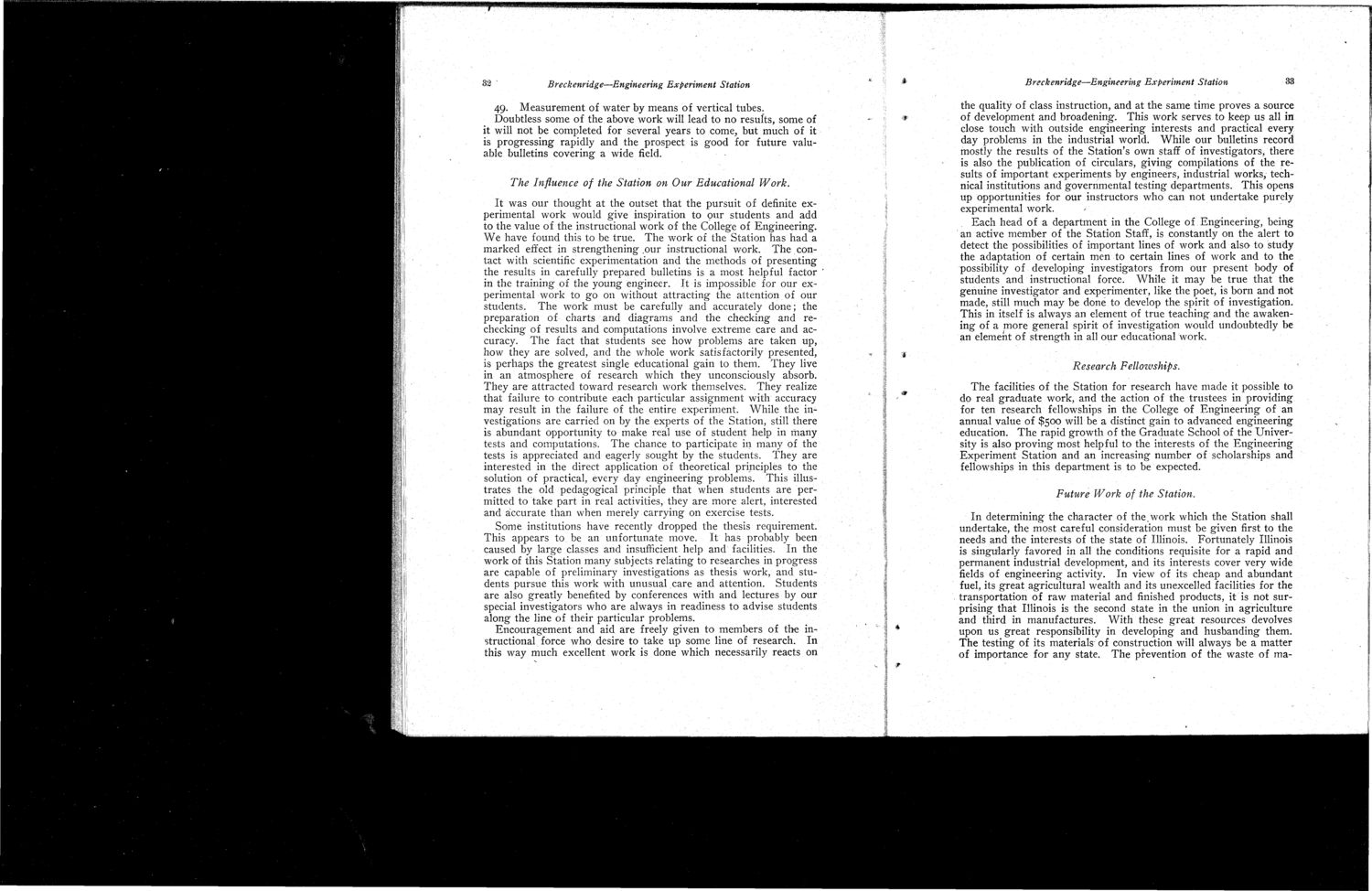| |
| |
Caption: Booklet - Engineering Experiment Station and Industry (1909)
This is a reduced-resolution page image for fast online browsing.

EXTRACTED TEXT FROM PAGE:
32 Breckenridge—Engineering Experiment Station Br eckenridge—Engineering Experiment Station 33 49. Measurement of water by means of vertical tubes. Doubtless some of the above work will lead to no results, some of it will not be completed for several years to come, but much of it is progressing rapidly and the prospect is good for future valuable bulletins covering a wide field. The Influence of the Station on Our Educational Work. It was our thought at the outset that the pursuit of definite experimental work would give inspiration to our students and add to the value of the instructional work of the College of Engineering. We have found this to be true. The work of the Station has had a marked effect in strengthening .our instructional work. The contact with scientific experimentation and the methods of presenting the results in carefully prepared bulletins is a most helpful factor in the training of the young engineer. It is impossible for our experimental work to go on without attracting the attention of our students. The work must be carefully and accurately done; the preparation of charts and diagrams and the checking and rechecking of results and computations involve extreme care and accuracy. The fact that students see how problems are taken up, how they are solved, and the whole work satisfactorily presented, is perhaps the greatest single educational gain to them. They live in an atmosphere of research which they unconsciously absorb. They are attracted toward research work themselves. They realize that failure to contribute each particular assignment with accuracy may result in the failure of the entire experiment. While the investigations are carried on by the experts of the Station, still there is abundant opportunity to make real use of student help in many tests and computations. The chance to participate in many of the tests is appreciated and eagerly sought by the students. They are interested in the direct application of theoretical principles to the solution of practical, every day engineering problems. This illustrates the old pedagogical principle that when students are permitted to take part in real activities, they are more alert, interested and accurate than when merely carrying on exercise tests. Some institutions have recently dropped the thesis requirement. This appears to be an unfortunate move. It has probably been caused by large classes and insufficient help and facilities. In the work of this Station many subjects relating to researches in progress are capable of preliminary investigations as thesis work, and students pursue this work with unusual care and attention. Students are also greatly benefited by conferences with and lectures by our special investigators who are always in readiness to advise students along the line of their particular problems. Encouragement and aid are freely given to members of the instructional force who desire to take up some line of research. In this way much excellent work is done which necessarily reacts on the quality of class instruction, and at the same time proves a source of development and broadening. This work serves to keep us all in close touch with outside engineering interests and practical every day problems in the industrial world. While our bulletins record mostly the results of the Station's own staff of investigators, there is also the publication of circulars, giving compilations of the results of important experiments by engineers, industrial works/ technical institutions and governmental testing departments. This opens up opportunities for our instructors who can not undertake purely experimental work. Each head of a department in the College of Engineering, being an active member of the Station Staff, is constantly on the alert to detect the possibilities of important lines of work and also* to study the adaptation of certain men to certain lines of work and to the possibility of developing investigators from our present body of students and instructional force. While it may be true that the genuine investigator and experimenter, like the poet, is born and not made, still much may be done to develop the spirit of investigation. This in itself is always an element of true teaching and the awakening of a more general spirit of investigation would undoubtedly be an element of strength in all our educational work. Research Fellowships. The facilities of the Station for research have made it possible to do real graduate work, and the action of the trustees in providing for ten research fellowships in the College of Engineering of an annual value of $500 will be a distinct gain to advanced engineering education. The rapid growth of the Graduate School of the University is also proving most helpful to the interests of the Engineering Experiment Station and an increasing number of scholarships and fellowships in this department is to be expected. Future Work of the Station. In determining the character of the.work which the Station shall undertake, the most careful consideration must be given first to the needs and the interests of the state of Illinois. Fortunately Illinois is singularly favored in all the conditions requisite for a rapid and permanent industrial development, and its interests cover very wide fields of engineering activity. In view of its cheap and abundant fuel, its great agricultural wealth and its unexcelled facilities for the transportation of raw material and finished products, it is not surprising that Illinois is the second state in the union in agriculture and third in manufactures. With these great resources devolves upon us great responsibility in developing and husbanding them. The testing of its materials* of construction will always be a matter of importance for any state. The prevention of the waste of ma-
| |